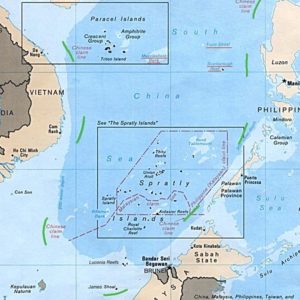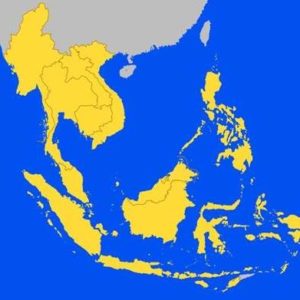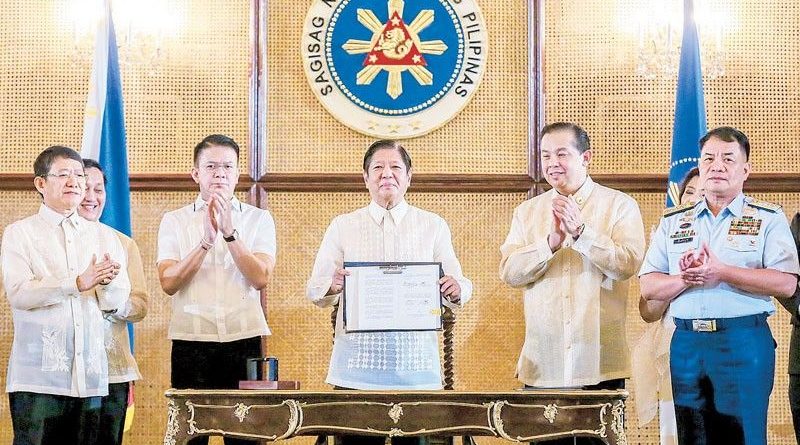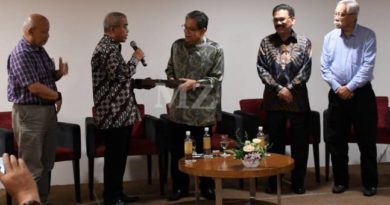ASEANEWS HEADLINE-WPS | MANILA: President Marcos signs laws asserting Philippines sea rights, sovereignty
https://www.youtube.com/watch?v=o7-_BwRjhts
WATCH VIDEO: https://www.youtube.com/watch?v=o7-_BwRjhts
.

MANILA, Philippines — President Marcos signed into law yesterday two measures designating sea and air routes for foreign ships and aircraft within the country’s archipelagic waters.
Marcos said Republic Act 12064 or the Philippine Maritime Zones Act clearly defines the extent and boundaries of the country’s maritime zones in accordance with the Constitution, the United Nations Convention on the Law of the Sea (UNCLOS) and the 2016 arbitral award, which reaffirmed the Philippines’ maritime entitlements and invalidated China’s sweeping claims in the South China Sea.
Meanwhile, RA 12065 or the Archipelagic Sea Lanes Act designates three sea lanes in the country’s archipelagic waters and their corresponding air routes. These are the Celebes Sea, Sibutu Sea and Balintang Channel.
“This (RA 12064) is essential in establishing the extent of our maritime jurisdiction and to ensure that our rights and duties as an archipelagic state are well-defined in order that all Filipinos can rightfully enjoy the riches of our seas,” Marcos said during the signing ceremonies at Malacañang.
“Maintaining the primacy of the UNCLOS and the 2016 arbitral award as our beacons in the maritime domain, the Philippines reaffirms its sovereignty, sovereign rights and jurisdiction in our waters,” the President said.
The enactment of RA 12064 sends a message to the international community that the Philippines is “staunchly committed to nurturing,
cultivating and protecting its maritime domain,” the Chief Executive said.
Marcos said defining and asserting the Philippines’ maritime zones would also ensure that Filipino fishermen would be able to pursue their livelihood free from uncertainty and harassment.
Senate President Francis Escudero, Speaker Martin Romualdez and Senate Majority Leader Francis Tolentino, the principal author of RA 12064 and RA 12065, were present during the signing of the measures.
Marcos said the measures had been under deliberation since the 15th Congress and were among the Marcos administration’s priority initiatives.
Talampas ng Pilipinas

In a press briefing at Malacañang, Tolentino lauded Marcos’ signing of the two laws.
“We’re happy because finally the twin laws have been signed and these are all very, very significant, historical,” Tolentino said.
He said the Maritime Zones Law would “enshrine, domesticate in our Philippine laws what we obtain through the 2016 arbitral ruling.”
“For the first time, we’re now legislating the name ‘West Philippine Sea’ and we’re now making reference to the eastern portion as ‘Talampas ng Pilipinas,’ formerly known as the Benham Rise, later named as the Philippine Rise,” the lawmaker said.
“We have to admit and acknowledge and admire the determination of President BBM in having these laws passed and signed,” he said.
Asked whether the new laws would prevent the Chinese from ramming Philippine vessels or engaging them in dangerous maneuvers, Tolentino responded: “The Revised Penal Code, would it prevent homicide?”
“So, the law is there, enforcement, we do that. The law is there to serve as the deterrence, the law is there to provide punishment for wrongdoers and the law – the stream laws would really fortify our sovereignty as an independent republic,” he said.
Tolentino said the new laws would empower the country to arrest encroaching foreign vessels and poachers beyond the 12-nautical-mile territorial sea.
Romualdez, for his part, said the two laws “enhance our efforts to protect our sovereign rights over the West Philippine Sea and to preserve and exploit the resources in these waters for the benefit of our people.”
“These new laws mark a historic moment in our efforts to secure and defend our maritime domain,” he said.
“By establishing boundaries and designating specific sea lanes, we strengthen our position under international law, safeguard our natural resources and enhance our security in the West Philippine Sea and beyond,” the Speaker said.
“By asserting our rights over the sea and air, we are in effect ensuring the utilization of our rich resources in our territorial waters for the benefit of our people,” Escudero, for his part, said.
“The crafting of these laws and its enforcement are in accordance with the UNCLOS. It provides the country with more teeth in responding to infractions against Philippine interests,” Escudero said.
“This is domestic law, on top of the 2016 arbitral ruling, that will bind executive officials and they cannot go against it,” he added.
Sen. Sherwin Gatchalian, one of the authors of the measures, said the passage of the two laws “is a significant step towards establishing the country’s boundaries necessary to ensure our sovereignty and enhance territorial protection.”
Sen. Risa Hontiveros, another author of the Maritime Zones law, said the new pieces of legislation would “help secure what is ours – our waters, our rich marine life – today and for future generations.”
Ads by:
New Philippine map out soon

National Mapping and Resource Information Authority administrator Peter Tiangco said a new Philippine map, which clearly indicates the WPS, would be out soon.
He said they are just awaiting the implementing rules and regulations (IRR) of the Maritime Zones Act.
“All areas where the Philippines has sovereignty and sovereign rights will be included in the new map,” Tiangco told Palace reporters.
“We already have the maps prepared, we are just waiting for the IRR in order for us to modify or revise the maps that we have prepared accordingly until final publication,” he said.
Tiangco said unlike the maps of the South China Sea published by China, the updated Philippine map “will have legal basis supported by existing laws.”
According to Marcos, the designated archipelagic sea lanes and air routes offer continuous, expeditious and unobstructed transit for vessels and air transports, while obliging them to comply with navigational regulations and procedures, as well as with the air rules of flight safety and protocols.
“The designated archipelagic sea lanes and air routes aim to facilitate safe passage for foreign ships and aircraft without compromising our national security nor diminishing our capacity for good environmental stewardship,” he said. Tolentino said the Archipelagic Sea Lanes Law is a “progeny” of RA 12064.
“And all of these will also be submitted to the International Maritime Organization as well as the ICAO (International Civil Aviation Organization),” he said.
“I look forward to the day when we… while onboard an aircraft coming overseas, when the pilot would announce that, ‘We are now entering the West Philippine Sea. Please fasten your seatbelt.’ And likewise, be shown in front of the passenger’s screen would be a map naming that area as West Philippine Sea,” Tolentino said.
Ads by:
Outdated
Department of Justice senior state counsel Fretti Ganchoon noted that the existing laws on maritime zones were outdated as they were issued before the 1982 UNCLOS.
“We don’t have a complete set of maritime zones. So the primary objective, I think, of this law (RA 12064) is to make sure that all of our existing laws related to maritime zones are updated and consistent with UNCLOS and this will also guide all our agencies when they perform their functions in the West Philippines Sea,” she said.
“So this would help our law enforcement agencies in the enforcement of our pertinent maritime laws in our maritime zones. So, this would give clarity to the enforcement of our laws especially in the West Philippine Sea of course,” she said.
Ganchoon said the Philippine government has the right to file diplomatic protest if other states would continue to violate its sovereign rights, particularly in the WPS.
The National Maritime Council (NMC) said the Maritime Zones and Archipelagic Sea Lanes laws are more than just legislation.
“They uphold and affirm our national sovereignty and a pledge to our maritime future,” NMC spokesman Alexander Lopez said.
For security analyst Chester Cabalza, founding president of the International Development and Security Cooperation, the two new laws on maritime zones and sea lanes are a “gift” to the Filipino people.
“It’s a gift to the Filipino people, especially that we have maritime insecurity in the West Philippine Sea,” he told “Storycon” on One News on Friday.
“It will not just cover the West Philippine Sea… We have our extended continental shelf in the Philippine Rise or Benham Rise. Here we can identify what are the internal waters, islands, rocks that belong to the Philippines,” he added. — Jose Rodel Clapano, Marc Jayson Cayabyab, Janvic Mateo


 Memento Maxima Digital Marketing
Memento Maxima Digital Marketing








